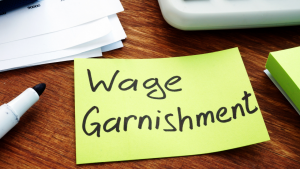Bank Account Garnished? Here’s What To Do Now.
Garnishment can be stressful and upsetting, and many people who experience garnishment are left feeling like they have no choice. You do have choices, but it’s important to work with a professional attorney who can help. The more you understand about garnishment and what it is, and the sooner you take action to defend yourself against a garnishment, the better off you’ll be. Here’s what you need to know about garnishment.
What Is a Garnishment?
Garnishment is what happens when a creditor starts to take money from your bank account or paycheck. It’s a legal action that creditors can take to collect money, after filing a lawsuit and getting a judgement against you. Some federal organizations like the IRS and student loan creditors can use garnishment as a tool to collect money that you owe them. These organizations can use garnishment even if they’ve never filed a lawsuit against you.
If you’re faced with a garnishment, there are actions you can take to protect yourself. Knowing those actions is important.
Can a Garnishment Be Avoided?
Garnishment can be avoided if you take action in the early stages of a problem to communicate with your creditors. Often, creditors will allow people who owe money to set up a payment plan. This is cheaper than going to court
If you’re having a hard time making payments, some creditors may allow you to simply pay off interest for a while. Other creditors may allow you to skip payments during your hardship and then return to making partial or full payments down the road.
Creditors may also choose to reduce your interest rate to make the payments more manageable. Of course, even if a creditor does file a lawsuit against you, you still have options. Some may allow you to settle the case before the court comes up with a judgement. Once a judgement is issued, your choices may be more limited.
Challenge the Garnishment
Once a judgement has been awarded, you’ll enter a period of time before the garnishment begins. The purpose of this wait time is to allow you to fight the garnishment. During this pause, you may be able to enter into a payment agreement with your creditor. Some creditors will agree to a payment agreement, while others will not. It’s important and helpful to have an attorney to help with this.
Attorneys understand the system and can often save money for their clients. Remember that many attorneys offer free or low-cost consultations. During this consultation, you can find out what your options are and how the attorney can help you.
File for Bankruptcy
Even after the garnishment has begun, filing a bankruptcy case will stop the garnishment. In fact, during most bankruptcy cases, an automatic stay goes into effect.
During this time, collection activity stops, including calls and letters from debt collectors. The garnishment stops during this time as well. In some cases, the creditor can ask the garnishment to continue, but most of the time, the garnishment is put on hold. Some types of debt can be discharged during a bankruptcy filing, other types of debt cannot.
Your bankruptcy attorney can help you determine whether your debt can be discharged, and can work with you to explore the options. Ultimately, filing bankruptcy may be able to help you get rid of many debts, pay down more debts and finally develop a healthy financial situation.
For more information about how you can avoid garnishment or get rid of a garnishment that you currently have, contact the bankruptcy attorneys from Clark and Washington – Atlanta’s premier bankruptcy attorneys.



